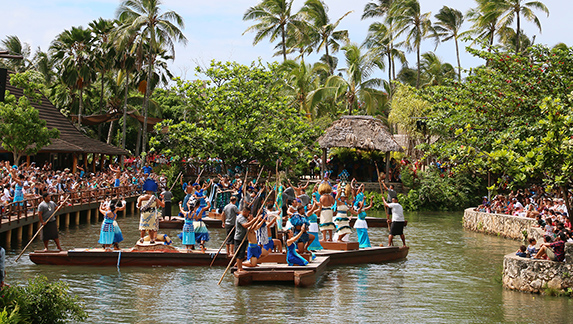
All of the Polynesians come together as one family during the finalé of the Polynesian Cultural Center’s new canoe celebration, Huki: One ‘ohana sharing aloha. (PCC photos by Mike Foley)
The Polynesian Cultural Center will officially launch the grand premiere of our new Huki: One ‘ohana sharing aloha canoe celebration on August 18, 2018. (‘Ohana means “family” in Hawaiian.) We present Huki each afternoon the Center is open at 2:30 on the freshwater lagoon near the Samoan Village. Huki is included in all PCC admission tickets.
Huki succeeds Rainbows of Paradise canoe show
The Center actually began a “soft” launch of Huki on July 12, 2018, when it replaced the popular Rainbows of Paradise canoe show. During its 18-year run approximately 10 million visitors enjoyed the more than 5,000 performances of Rainbows, and more than a thousand of our PCC “cast members” helped bring the colorful show to life. Typical of the close bonds that exist among the PCC “family” of employees, some alumni even returned on July 11 with special permission to dance in the final performance of Rainbows, while others joined the audience.
A very unique canoe celebration
Delsa Atoa Moe, PCC vice president of cultural presentations, explained that “Huki is a very unique canoe celebration. It’s very different from anything PCC has done in the past. We’re not focusing on the individual cultures as much as we are on the ocean and how it pulls us all together. We also use this theme to tell the story of Laie, and how the Polynesians came together in this place.”
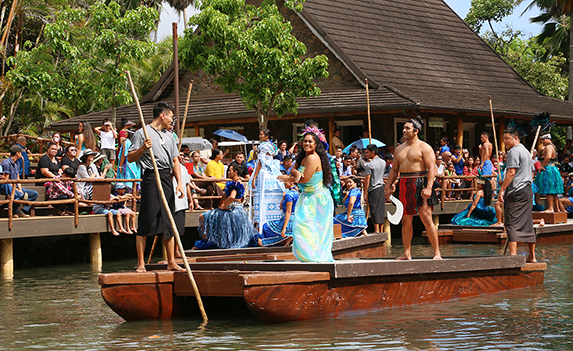
Earth Mother and the legendary demigod Maui are part of Huki‘s storyline.
PCC canoe show manager Jon Raymond Mariteragi said Huki starts with dramatizations of the legendary demigod Maui harnessing the sun and dragging up the islands with his magical fishhook. Though living far apart, the people on the Polynesian islands use the ocean as a “highway” to interact with each other, as portrayed in a canoe-borne cultural exchange, marriage and even warfare among the islanders.
Huki’s storyline continues: With western contact, the Polynesians adapted music and instruments, then added their own rhythms, words and motions to both traditional and contemporary songs. Choral music also became an important part of Christian worship.
The Laie Hukilau sets the precedent
Then, to raise funds to rebuild their chapel, which was destroyed by fire in 1940, Polynesian Latter-day Saints living in Laie combined island entertainment and a luau with a traditional hukilau fishing event.
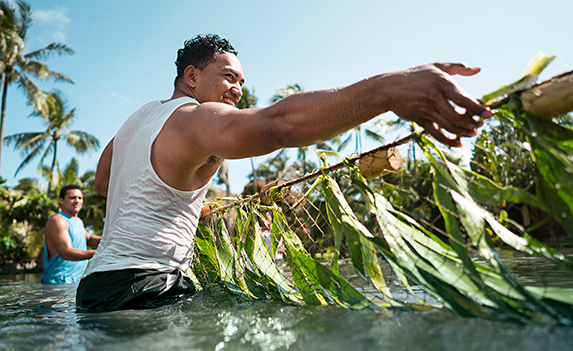
Huki portrays the role of the Laie Hukilau in establishing the Polynesian Cultural Center. (PCC photo)
The guests loved it all, including helping to pull in the fishing nets. The Laie Hukilau became a tourist attraction from its opening in 1948: The aloha spirit and talent of the local islanders, combined with the Hukilau Song and Uncle Hamana Kalili’s famous shaka sign, helped spread its fame around the world.
Hollywood helped, too
One segment of Huki portrays how popular singer Elvis Presley filmed part of his 1965 movie, Paradise Hawaiian Style, at the Center and even adapted our signature song, Bula Laie, into the English version Drums of the Islands.
When Brigham Young University–Hawaii (known as Church College of Hawaii from 1955–1974) started up, more Polynesians and others came to Laie; and university and church leaders soon adapted the Hukilau concept to found the Polynesian Cultural Center in 1963 as a means to help students pay for their education.
The Polynesians have gathered together again at the PCC
As the canoes come together for the finalé of Huki, the emcee says, “Now you know my story…and why the Polynesians have gathered again at the PCC in beautiful Laie, for the waters around us do not divide us. They unite us into one ‘ohana sharing aloha.”
“The overall takeaway from the show is that we are all a member of a worldwide family,” Moe said.
Three-plus years of planning
Moe also pointed out that a special creative committee has been working on Huki for more than three years. Members of the committee include Elder David T. Warner, a Latter-day Saint Area Seventy, and Ross Boothe as consultants. “They were also both consultants for us on Hā: Breath of Life, and they’re back on this project.”
PCC performance specialists are Steve Laulu, Samoa; Rāhira Makekau, Aotearoa (New Zealand); Kalivati Volavola, Fiji; Pōmaika’i Krueger, Hawaii; ‘Alamoti Taumoepeau, Tonga; and Jon Raymond Mariteragi, Tahiti.
“Dallin Muti composed four original songs for Huki, and he’s also responsible for the entire soundtrack; Roger Ewens, Cathy Teriipaia and Fatai Feinga oversaw all of our costuming and wardrobe, and Lance Aina was responsible for canoe choreography,” Moe said.
Muti, who started at the Center in 1986, recalled the new theme song he wrote came to him as David Warner was discussing the concept of Huki. “I grabbed a guitar, and the words to the song just came out. It just felt right,” he said. “To me, this is a special place, and I’m grateful for the opportunity to work here,” he added.
Moe also said PCC carvers created the custom-built canoes used in Huki, “including a miniature version of our Fijian camakau outrigger canoe, and a Maori-style double-outrigger. They also carved the magnificent wooden drums and many other custom-made props and accessories worn by the performers.”
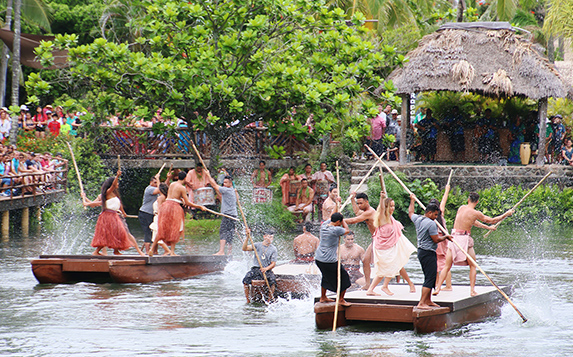
The Polynesians celebrate after Maui fishes up the islands during Huki.
Launching Huki takes PCC-wide support
In addition to these people, Mariteragi said he strongly feels that the new canoe celebration is much more than a theater department production. “Every division in the Center has been heavily involved. We’ve all pulled together to help launch Huki.”
For example, “blue-shirt” Physical Facilities workers and labor missionaries have extensively expanded the seating capacity around the lagoon. The tech crew installed an all-new surround-sound system, and wardrobe ladies and labor missionaries created hundreds of new costumes.
Always grateful for those who came before
Mariteragi also expressed gratitude for the previous Rainbows canoe pageant. “There’s always going to be a time at the Center when something that’s been with us for a while has had a nice run, and then something new comes in. That’s always been part of our legacy. That’s what makes the Center great. Because of things that have been passed down, we’re always grateful for those who came before.”
“I honor all the individuals who poured their heart and soul into the making of Rainbows, and all our alumni and current employees who kept it going over the years. This is part of the spirit that really makes the Polynesian Cultural Center unique. We have a history of honoring those who have come before, and being grateful for the legacy we have.”
“I love the new canoe celebration because while we’ve always had recurring themes, this is one of the first times we’re actually telling the story of the Polynesian Cultural Center. Huki portrays actual people and events, and we’re putting that on display,” Mariteragi said.
Creativity and historical legacy
“There’s both a very creative, contemporary side of the show, and a historical story of our heritage. As Delsa [Moe] reminded us at one hard point in the planning stage, from the times of the legendary Maui our people were resilient.”
“We are excited to share a brand-new canoe celebration with our guests,” said Alfred Grace, president and CEO of the Polynesian Cultural Center, in separate remarks. “Our team has been working tirelessly to ensure that Huki’s story authentically captures the unique history and folklore of Polynesia and that our facilities are renovated and reinvigorated to ensure that the experience is elevated for all our guests.”
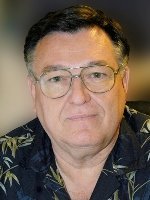 Story and photos (except as indicated) by Mike Foley, who has been a full-time freelance writer and digital media specialist since 2002. Prior to that, he had a long career in marketing communications, PR, journalism and university education. The Polynesian Cultural Center has used his photos for promotional purposes since the early 1970s. Foley learned to speak fluent Samoan as a Mormon missionary before moving to Laie in 1967. He has traveled extensively over the years throughout Polynesia, other Pacific islands, and Asia. He is mostly retired but continues to contribute to PCC and various other media.
Story and photos (except as indicated) by Mike Foley, who has been a full-time freelance writer and digital media specialist since 2002. Prior to that, he had a long career in marketing communications, PR, journalism and university education. The Polynesian Cultural Center has used his photos for promotional purposes since the early 1970s. Foley learned to speak fluent Samoan as a Mormon missionary before moving to Laie in 1967. He has traveled extensively over the years throughout Polynesia, other Pacific islands, and Asia. He is mostly retired but continues to contribute to PCC and various other media.

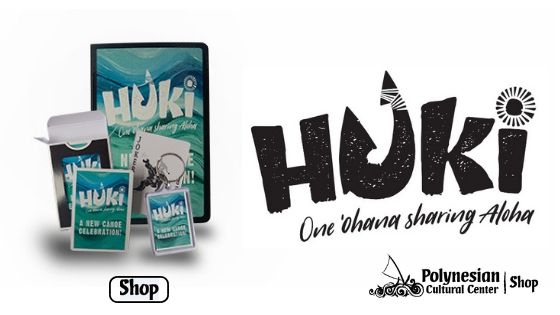
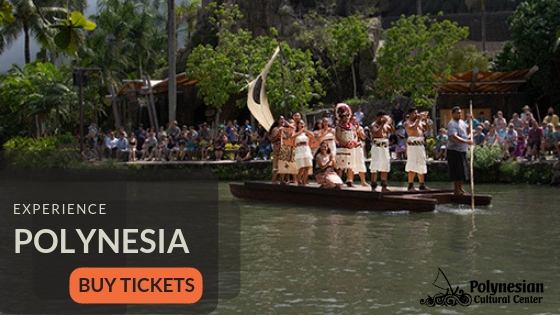
Recent Comments